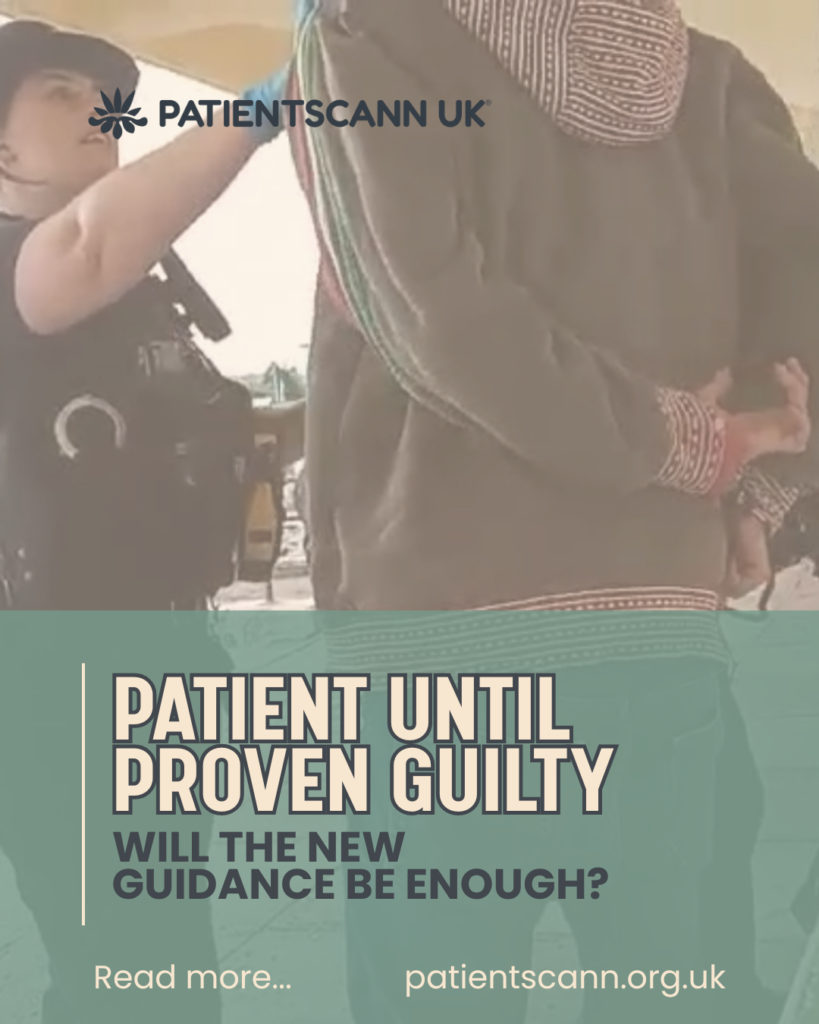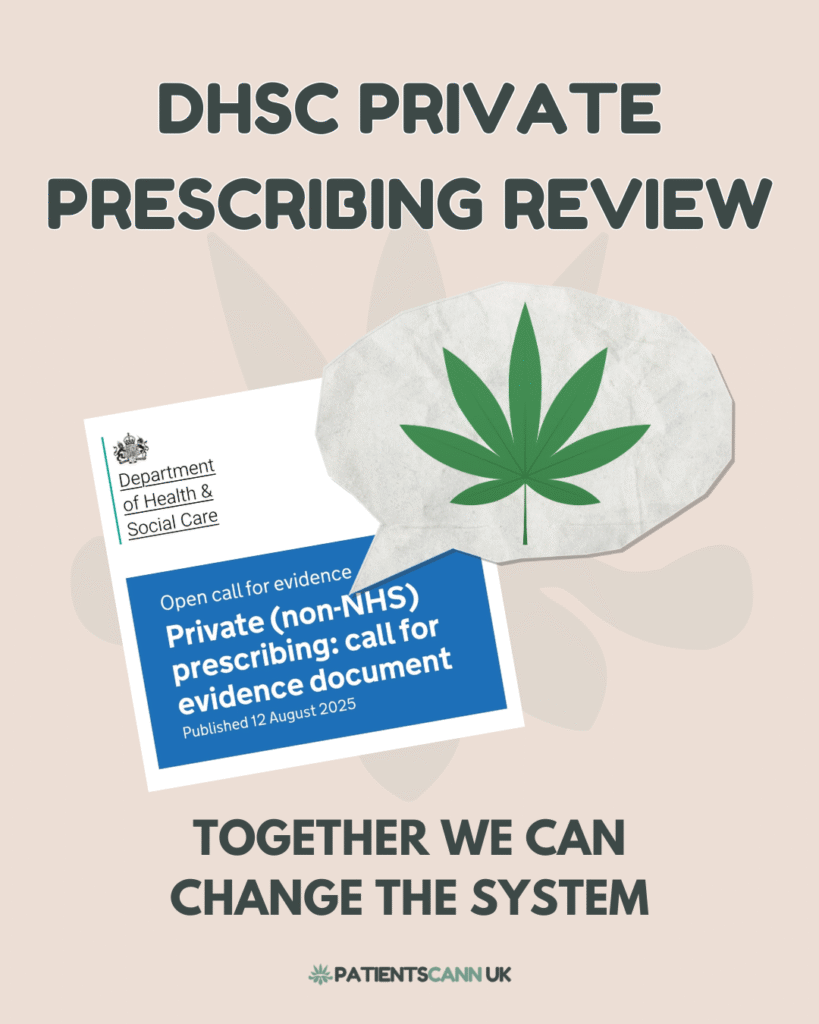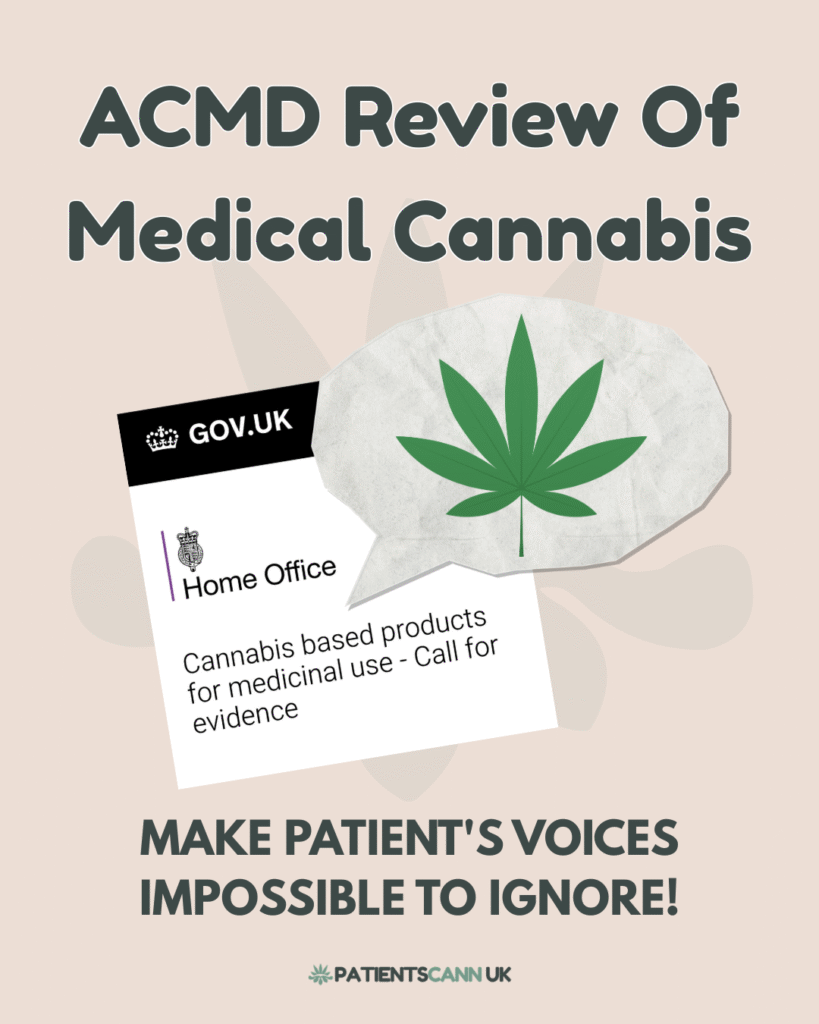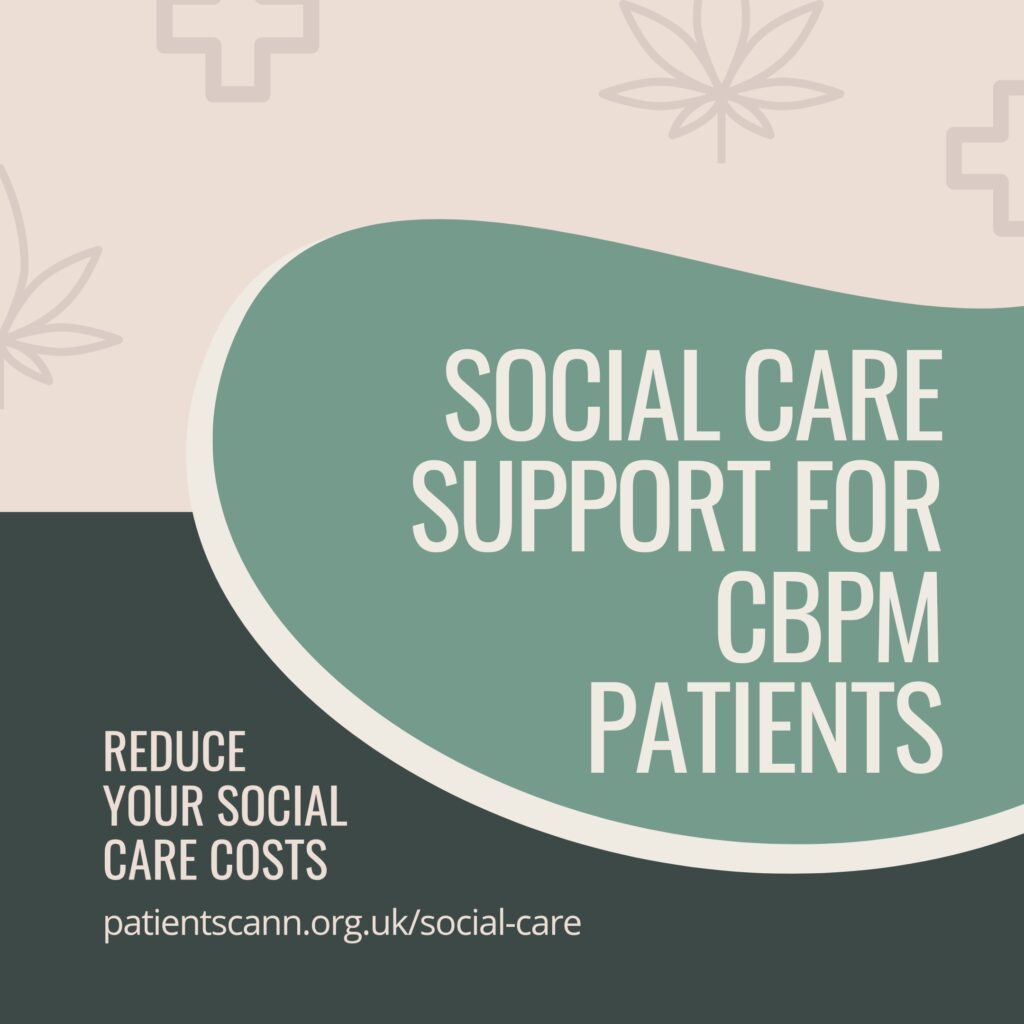UTAW Passes Major Motion to Protect Workers Prescribed Medical Cannabis

UTAW passes landmark motion to protect workers prescribed medical cannabis. Learn how unions, employers and patients can tackle stigma and discrimination.
PatientsCann UK Statement on NPCC Guidance for Policing Medical Cannabis Patients

Earlier this week the National Police Chiefs’ Council (NPCC) issued updated guidance instructing police forces across the UK that medicinal cannabis patients should be treated as “patients first, suspects second” when encountered by officers. The guidance explicitly recognises that people in lawful possession of cannabis-based products for medicinal use should be assumed to be patients until proven otherwise, and clarifies that individuals with a valid prescription do not need to hold or present a Cancard, a privately-run card scheme that charges an annual fee and is not a legal requirement under UK law. This development represents a positive and overdue step in aligning policing practice with the legal reality established when cannabis-based medicines were moved to Schedule 2 of the Misuse of Drugs Regulations in November 2018… more than seven years ago. That regulatory change made it lawful to possess cannabis-based products for medicinal use when prescribed by an appropriate clinician. However, as a leading UK medical cannabis patient organisation, PatientsCann UK welcomes the guidance with cautious optimism, because guidance on paper does not automatically translate into consistent, informed practice on the streets. Why Guidance Is Not Enough Without Understanding It is an ongoing reality that many frontline officers still lack accurate awareness of the legal status of medical cannabis: Independent reports and guides have indicated that a significant proportion of officers may still be unaware that medical cannabis can be legally prescribed in the UK, even years after the law changed. (Curaleaf Clinic) Previous force guidance responses under Freedom of Information showed that some police forces did not have internal training or up-to-date briefing materials on this subject, and officers were still being expected to rely primarily on older Home Office circulars and their own discretion. (essex.police.uk) This gap between policy and practice raises serious concerns for patients. The NPCC’s intent, that every police officer should treat someone carrying lawful medical cannabis as a patient first, is commendable. But unless officers are consistently aware of the legal framework, understand how to verify lawful possession, and are trained to apply the guidance, the lived experience of patients may not improve significantly. Clarification and Practical Challenges The NPCC guidance confirms that a Cancard is not legally required for patients with a valid prescription, a vital clarification given the confusion that has surrounded this scheme. Cancard was originally introduced to assist officers in identifying individuals claiming medical need, particularly for those who may be waiting for a prescription or unable to afford one. However, it has always been a discretionary tool, not legal proof of lawful possession. Simply put: 🔹 A card indicating intent or condition does not change the law. That said, PatientsCann UK continues to support patients in carrying necessary documentation (prescription, dispensing label on original packaging, photo ID) where possible, because in the current reality, this often reduces friction in police encounters. Our Concern: Words vs Reality Our central worry remains this: Will the principle of “patients first, suspects second” become the norm, or will we continue to see a default attitude of “guilty until proven innocent”? Guidance is only as effective as the understanding and awareness of the officers applying it. Many patients still report experiences where officers: Misinterpret the law Lack confidence in recognising legitimate prescriptions Treat possession of medical cannabis as inherently suspicious …even when a patient is carrying evidence of lawfully prescribed medication. In some cases this results in needless stress, seizure of medicine, or unnecessary investigations. What PatientsCann UK Calls For To ensure the NPCC’s guidance truly benefits patients, we call for: Rapid, centralised training modules for all frontline officers on the legal status of medical cannabis and the practical application of this guidance. Clear internal briefings in every force that reinforce that lawful possession with a valid prescription is not an offence. Public-facing awareness efforts so patients know what documentation to carry and what their legal rights are. Monitoring and reporting mechanisms to track whether the guidance translates into improved outcomes for patients. We welcome the NPCC guidance as a necessary and positive affirmation of patients’ rights under the law. But we must be vigilant, not just about what the guidance says, but how it is understood and implemented in every police force across the UK. For too long patients have been left to explain something that should be common knowledge within policing. Now, more than ever, we must work together; patients, clinicians, law enforcement, and the wider public, to ensure that legal status and human dignity are recognised equally at every encounter. Mohammad Ismail “Ish” Wasway PatientsCann UK The UK’s Medical Cannabis Patient Organisation
Help Shape The Future of Medical Cannabis

At PatientsCann UK, we represent the voices of patients who rely on safe, effective, and regulated access to medical cannabis. Since its legalisation in 2018, many people have continued to face unnecessary barriers to treatment, from stigma and misinformation to the limited availability of NHS prescriptions. For thousands of patients, private prescriptions remain the only viable route to accessing the medicine they need. That’s why the Department of Health and Social Care’s “Private (non-NHS) Prescribing: Call for Evidence” is such an important opportunity. This review could influence how private prescribing works in the UK, including how cannabis-based medicines are accessed, regulated, and supported by clinicians. Why This Matters The call for evidence invites responses from across the healthcare system, including clinicians, prescribers, pharmacists, healthcare organisations, and patient groups. While the questions are primarily aimed at professionals, it is crucial that patients and carers also share their experiences. By contributing evidence and lived experience, we can help policymakers understand: How private prescribing supports patients who are unable to access NHS treatment. The challenges of affordability, continuity of care, and stigma in private medical cannabis access. The need for greater clinical education and confidence around prescribing cannabis-based medicines. The importance of protecting safe, regulated, and equitable access for all patients. Our Position PatientsCann UK believes that this review must:Protect the right of patients to access regulated medical cannabis safely and affordably.Promote fairness and consistency between NHS and private prescribing pathways.Address stigma and empower clinicians to prescribe based on evidence, not fear.Encourage more research, education, and evidence-based practice across the medical field. This consultation provides a rare chance to shape how the UK approaches private prescribing, and to ensure medical cannabis patients are not overlooked. How to Take Part Your experience is evidence — share it.The Private (non-NHS) Prescribing: Call for Evidence is now open to submissions from individuals and organisations with knowledge or experience of private prescribing. Visit: Private (non-NHS) Prescribing: Call for Evidence – GOV.UKDeadline: 11:59 pm, 4 November 2025 You do not need to answer every question, but you must select Submit at the end for your response to count. How Patients Can Encourage Healthcare Professionals You can play an important role in raising awareness of this consultation within your own care networks. Here are a few ways to help: Start the conversation. Mention the review to your prescribing clinician, pharmacist, or nurse and let them know the deadline. Many professionals may not yet be aware of it. Share the link. Send your clinic, GP practice, or specialist the official GOV.UK consultation page and encourage them to share it with colleagues. Speak to both sides. Whether your care is through a private medical cannabis clinic or the NHS, professionals across both systems can contribute valuable insight on access, patient safety, and clinical challenges. Explain why it matters. Let them know that evidence from healthcare professionals — especially those working with medical cannabis — can directly shape how government policy supports safer and fairer access for patients. Spread awareness. Share our post and tag your clinic, pharmacy, or medical organisation on social media to encourage wider participation. Your voice can help ensure that both patients and healthcare professionals are represented in this important review. Important Note This consultation is separate from the ACMD call for evidence on cannabis-based medicinal products, which focuses on clinical data and scheduling. Both reviews are crucial, and we encourage responses to each. Together, we can ensure that clinicians, patients, and organisations play a leading role in shaping an equitable and evidence-based future for medical cannabis access in the UK. 💚
PatientsCann UK Statement on the ACMD Review of Medical Cannabis

The Advisory Council on the Misuse of Drugs (ACMD) is reviewing cannabis-based products for medicinal use (CBPMs).
This Isn’t a Movement, It’s a Mess
A brutally honest call-in to the UK medical cannabis patient community, about ego, division, and why we’re our own worst enemy.
Network Rail’s Response to Our Concerns: A Call for Fair and Transparent Policy

Network Rail’s policy breaches the Equality Act 2010. PatientsCann UK fights for fair treatment—take action now.
THCa is it legal?
Tetrahydrocannabinolic acid (THCa) is a non-psychoactive cannabinoid found abundantly in raw cannabis plants. Unlike its decarboxylated form, tetrahydrocannabinol (THC), THCa does not produce intoxicating effects. This distinction is crucial for medical cannabis patients, healthcare professionals, and industry experts seeking to understand the therapeutic potential and legal considerations of THCa, particularly within the United Kingdom. Biochemical Nature of THCa THCa serves as the acidic precursor to THC. In its natural state, cannabis plants synthesise cannabinoids in their acidic forms, with THCa being predominant. When exposed to heat through processes like smoking, vaping, or cooking—a reaction known as decarboxylation—THCa loses a carboxyl group, transforming into THC, the compound responsible for cannabis’s psychoactive effects. Therapeutic Potential of THCa Emerging research suggests that THCa may offer several health benefits: Psychoactivity of THCa In its raw form, THCa is non-psychoactive and does not produce the “high” associated with THC consumption. This non-intoxicating nature makes it an attractive option for patients seeking therapeutic benefits without cognitive impairment. However, it’s essential to note that when THCa is heated, it converts into THC, thereby gaining psychoactive properties. Applications of THCa Given its potential therapeutic properties and non-psychoactive nature, THCa is utilised in various forms: Legal Status of THCa in the UK The Advisory Council on the Misuse of Drugs (ACMD) has provided insights into the behaviour and control status of tetrahydrocannabinolic acid (THCa) in its report on consumer cannabidiol (CBD) products. The report highlights that THCa does not significantly convert to Δ9-tetrahydrocannabinol (Δ9-THC) within the human body after ingestion. Additionally, while THCa can decarboxylate into Δ9-THC at temperatures below 100°C, this process requires prolonged exposure; at room temperature, the conversion is negligible. These findings suggest that THCa’s limited potential for in vivo conversion to psychoactive Δ9-THC may influence its regulatory status. The legal framework surrounding THCa in the United Kingdom is complex. While THCa itself is non-psychoactive, it is closely regulated due to its potential to convert into THC when heated. This conversion raises concerns for law enforcement and regulatory bodies. According to the UK’s Misuse of Drugs Regulations 2001, THC is a controlled substance, and any product containing cannabinoids that can be converted into THC may fall under this regulation. In practice, this means that while THCa is not explicitly listed as a controlled substance, its presence in products intended for consumption could be subject to legal scrutiny, especially if there’s a likelihood of decarboxylation into THC. Therefore, products containing THCa are subject to stricter controls and are generally less accessible than CBD products. In the United Kingdom, cannabis and its derivatives are primarily regulated under the Misuse of Drugs Act 1971 and the Misuse of Drugs Regulations 2001. Cannabis is classified as a Class B controlled drug, making it unlawful to possess, supply, produce, import, or export without appropriate licensing. The legislation defines cannabis to include any part of the plant, excluding mature stalks, fibre, and seeds. Additionally, cannabinoids such as THC are specifically controlled substances. While cannabidiol (CBD) in its pure form is not controlled, products containing other cannabinoids, including THCa, are subject to regulation. The Home Office acknowledges that due to challenges in isolating CBD from other cannabinoids, consumer CBD products may contain varying amounts of controlled substances like THC and THCa. Therefore, any product containing controlled cannabinoids is classified as a Class B controlled drug unless it meets the “exempt product” criteria outlined in Regulation 2 of the Misuse of Drugs Regulations 2001. Exempt Product Criteria For a product to be considered exempt, it must fulfil specific conditions: If a product meets all these criteria, it is not subject to the prohibitions on importation, exportation, production, supply, and possession under the Misuse of Drugs Act 1971. Conclusion THCa represents a promising cannabinoid with potential therapeutic benefits for various medical conditions. Its non-psychoactive nature makes it suitable for patients seeking relief without the intoxicating effects of THC. The sale and distribution of THCa products in the UK occupy a legally ambiguous space. While businesses continue their operations, the potential for legal challenges remains due to the intricate regulatory framework governing cannabis and its derivatives. It is imperative for businesses and consumers to stay informed and consult legal experts when navigating this evolving landscape. References Drug Licensing Factsheet (Cannabis, CBD & Other Cannabinoids) Consumer CBD products report – ACMD Is THCa legal in the UK – r/LegalAdviceUK – Reddit The Legal Weed No One’s Talking About – Vice Disclaimer The information provided in this article is intended for educational and informational purposes only and should not be construed as legal or medical advice. While efforts have been made to ensure the accuracy of the content, however the legal framework surrounding THCa is complex and subject to change. Readers are advised to consult with qualified legal professionals to obtain guidance tailored to their specific circumstances. The authors and publishers disclaim any liability arising from the use or misuse of the information contained herein.
Legal Support for Medical Cannabis Patients in the UK

Since the legalisation of medical cannabis in the UK in 2018, patients have faced numerous challenges in accessing and utilising cannabis-based medicinal products (CBMPs). Despite legal provisions, the landscape remains fraught with limited support, societal stigma, and complex legal hurdles. Organisations like Seed Our Future play a crucial role in advocating for patients’ rights and providing necessary support. Challenges in Legal Support The legal framework surrounding medical cannabis in the UK is complex, creating numerous obstacles for patients seeking treatment. While specialist doctors are legally permitted to prescribe cannabis-based medicinal products (CBMPs), access remains severely limited, forcing many patients to navigate a difficult and often expensive system. One of the primary challenges is the scarcity of NHS prescriptions for medical cannabis. Despite its legal status, NHS doctors rarely prescribe CBMPs, leaving most patients with no choice but to turn to private clinics. However, private prescriptions can be prohibitively expensive, making access to medical cannabis a privilege rather than a right for many who need it. Legal uncertainties further complicate matters. Many patients struggle to understand the exact legalities surrounding the possession and use of their prescribed cannabis, particularly in public spaces or workplaces. Questions about where they can legally consume their medication, how employers should accommodate their needs, and whether they risk law enforcement scrutiny add to the confusion and anxiety patients face daily. A significant barrier to proper legal support is the widespread lack of awareness. Many patients, healthcare professionals, and even service providers do not fully understand the legal rights and regulations governing medical cannabis use. This gap in knowledge often results in patients being misinformed or hesitant to assert their rights, while some service providers may be unwilling to support patients prescribed CBMPs simply due to uncertainty about the legal implications. Societal Stigma Despite its legalisation for medical use, cannabis continues to carry a deep-rooted stigma due to its long-standing association with recreational use and illegality. This stigma affects patients in several ways, often leading to unnecessary challenges and discrimination. One of the most significant issues is public perception. Many medical cannabis patients face judgment or misunderstanding from the public, which can result in social isolation or even outright discrimination. The misconception that all cannabis use is recreational or illicit contributes to this negative outlook, making it harder for patients to openly discuss their treatment or seek support. Employment is another area where stigma creates difficulties. Despite legal protections, employees who use medical cannabis may encounter prejudice or unfair treatment in the workplace. Employers who lack awareness or understanding of medical cannabis laws may view its use as problematic, even when it is prescribed for legitimate health conditions. This can lead to unnecessary workplace conflicts, job insecurity, or even wrongful dismissal. Stigma also extends into the healthcare system itself. Some healthcare professionals remain hesitant to prescribe cannabis-based medicinal products (CBMPs) due to lingering biases or a lack of education on the subject. This reluctance can leave patients struggling to access the treatment they need, forcing them to seek expensive private prescriptions or, in some cases, go without medication entirely. Overcoming these societal barriers requires greater public education, stronger legal protections, and a shift in cultural attitudes towards medical cannabis. Legal Support Resources For patients seeking legal assistance, several law firms and organisations specialise in areas pertinent to medical cannabis use: Organisation/Law Firm Specialties Overview Seed Our Future Legislative Research, Education, Patient Support A national campaign organisation dedicated to legislative and historical research, education through open-source reports, lectures, and articles. They provide support to UK citizens affected by unjust laws and offer assistance to medical cannabis patients facing legal and discrimination cases. Ringrose Law Medical Negligence, Discrimination, and more Offers services in medical negligence and criminal defense, pertinent to medical cannabis patients facing related legal challenges. Their team is equipped to handle cases involving medical malpractice and criminal allegations. While our current list of law firms and organisations offering legal support to medical cannabis patients in the UK is limited, we anticipate its growth as more legal professionals gain a comprehensive understanding of medical cannabis law. As awareness increases and the legal landscape evolves, we are committed to expanding our directory to better serve patients’ needs. We encourage lawyers and solicitors with relevant expertise to contact us, so we can include their services in our list and collectively enhance support for the medical cannabis community. Medical cannabis in the UK remains complex due to limited support and persistent stigma. Organisations like Seed Our Future are essential in advocating for patient rights, providing education, and challenging unjust laws. Supporting such initiatives is crucial for fostering a more informed and compassionate approach to medical cannabis use. Note: This article is for informational purposes only and should not be considered legal advice. For specific legal concerns, consult with a qualified legal professional. Medical Cannabis Employment Medical Cannabis Housing Medical Cannabis Driving Seed Our Future Ringrose Law
Claiming Social Care Support for Medical Cannabis Patients in the UK

Medical cannabis patients in the UK who receive social care packages from their local authority can apply to have their cannabis-based prescription medicines (CBPM) costs assessed as Disability Related Expenditure (DRE). If accepted, this may reduce the costs of their social care charges but does not cover costs of the cannabis prescription. Understanding Social Care Charges Under Section 14 of the Care Act 2014, local authorities can charge for social care, but they must ensure that such charges are fair and transparent. A financial assessment will determine what an individual can afford, factoring in: The assessment will disregard: Claiming CBPM Costs as DRE Patients can request that their CBPM prescription costs be considered DRE. While many councils have predefined checklists of eligible expenses, additional items may also be considered if supported by evidence. Local authorities must follow the Care Act 2014 principles, which include promoting individual wellbeing, social inclusion, and independence. If prescription costs are not accepted as DRE, it could be considered a breach of the Act, especially if this impacts a patient’s wellbeing or independence. Supporting Your Claim To claim CBPM costs as DRE, patients must provide evidence demonstrating: Unfortunately, many councils may not accept evidence from medical cannabis prescribers and instead require support from a GP and/or healthcare consultant. Patients are encouraged to request a supporting letter from their GP or healthcare consultant, detailing the necessity of CBPM and its role in reducing other treatments, such as opioids. If Your Claim Is Denied If a local authority rejects your request to classify CBPM costs as DRE, you can: The Ombudsman can recommend remedies for councils to implement. While their recommendations are not legally binding, councils rarely refuse to comply. Ensure that all medical evidence is shared with the Council and the Ombudsman. Example Case In a recent case (LGSCO reference: 24 001 331), Brighton & Hove City Council was found at fault for mishandling a social care assessment. Patients can use such precedents to support their claims. In the recent review by the Local Government and Social Care Ombudsman (LGSCO), significant concerns were raised regarding how a council handled a patient’s request to include medical cannabis costs as Disability Related Expenditure (DRE): Implications This case highlights the importance of councils adhering to their legal duty to consider all relevant evidence and provide transparent justifications for their decisions. Patients who encounter similar challenges are encouraged to challenge such decisions through formal complaints and escalate them to the Ombudsman if necessary. Key Takeaways For further guidance: Local Government and Social Care Ombudsman: https://www.lgo.org.uk/ Care Act Statutory Guidance: https://www.gov.uk/government/publications/care-act-statutory-guidance/care-and-support-statutory-guidance Medical Cannabis as Disability Related Expenditure Social Care Case Playlist by Cannabis is Medicine UK: https://www.youtube.com/playlist?list=PLmL0L5mPiFAUwDl6bG51wPOu-53MGGQMo By understanding the process and advocating for your rights, you can ensure fair consideration of your medical cannabis prescription costs within your social care assessment.
Ethnic Diversity in Cannabis: Navigating Stigma and Health Challenges

In this article, we explore the stigma associated with cannabis, the challenges faced by ethnic communities in the UK, and offer guidance for those seeking medical cannabis treatment.
